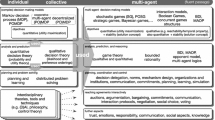Abstract
We introduce and investigate formal quantitative measures of inconsistency between the beliefs of agents in multi-agent systems. We start by recalling a well-known model of belief in multi-agent systems, and then, using this model, present two classes of inconsistency metrics. First, we consider metrics that attempt to characterise the overall degree of inconsistency of a multi-agent system in a single numeric value, where inconsistency is considered to be individuals within the system having contradictory beliefs. While this metric is useful as a high-level indicator of the degree of inconsistency between the beliefs of members of a multi-agent system, it is of limited value for understanding the structure of inconsistency in a system: it gives no indication of the sources of inconsistency. We therefore introduce metrics that quantify for a given individual the extent to which that individual is in conflict with other members of the society. These metrics are based on power indices, which were developed within the cooperative game theory community in order to understand the power that individuals wield in cooperative settings.
Similar content being viewed by others
Notes
In the present paper, we will not be concerned with the axiom known as additivity.
Consider the case where \(\Delta = \{\lnot K p \rightarrow q, \lnot K q \rightarrow p\}\). In this case there are two expansions of \(\Delta \): one containing \(p\) but not \(q\), the other containing \(q\) but not \(p\). The set \(\Delta = \{K p\}\) has no expansions.
Exactly how they achieve this isn’t relevant here, but in essence they recursively construct a grounded extension [6] so that when the dialogue terminates both agents agree on the acceptability of a common set of beliefs.
References
Ågotnes T, van der Hoek W, Wooldridge M (2011) Scientia potentia est. In: Proceedings of the Tenth International Joint Conference on autonomous agents and multiagent aystems (AAMAS-2011). Taipei, Taiwan
Besnard P, Hunter A (2008) Elements of argumentation. The MIT Press, Cambridge
Bond AH, Gasser L (eds) (1988) Readings in distributed artificial intelligence. Morgan Kaufmann Publishers, San Mateo
Brewka G, Dix J, Konolige K (eds) (1997) Nonmonotonic reasoning: an overview. Center for the Study of Language and Information
Chalkiadakis G, Elkind E, Wooldridge M (2011) Computational aspects of cooperative game theory. Morgan-Claypool
Dung PM (1995) On the acceptability of arguments and its fundamental role in nonmonotonic reasoning, logic programming and n-person games. Artif Intell 77:321–357
Fagin R, Halpern JY, Moses Y, Vardi MY (1995) Reasoning about knowledge. The MIT Press, Cambridge
Gottlob G (1992) Complexity results for nonmonotonic logics. J Logic Comput 2:397–425
Grant J, Hunter A (2006) Measuring inconsistency in knowledge bases. J Intell Inf Syst 27:159–184
Grant J, Hunter A (2011) Measuring consistency gain and information loss in stepwise inconsistency resolution. In: Proceedings of European Conference on symbolic and quantitative approaches to reasoning with uncertainty (LNCS 6717). Springer, Berlin, pp 362–373
Hunter A (2006) How to act on inconsistent news: ignore, resolve, or reject. Data Knowl Eng 57:221–239
Hunter A, Konieczny S (2011) On the measure of conflicts: Shapley inconsistency values. Artif Intell 174:1007–1026
Knight KM (2002) Measuring inconsistency. J Philos Logic 31:77–98
Konieczny S, Lang J, Marquis P (2003) Quantifying information and contradiction in propositional logic through epistemic tests. In: Proceedings of the 18th International Joint Conference on artificial intellignce (IJCAI’03), pp 106–111
Konolige K (1986) A deduction model of belief. Pitman Publishing, London; Morgan Kaufmann, San Mateo
Marek W, Truszczynski M (1991) Autoepistemic logic. J ACM 38(3):588–619
Parsons S, Wooldridge M, Amgoud L (2003) Properties and complexity of some formal inter-agent dialogues. J Logic Comput 13(3):347–376
Pigozzi G (2006) Belief merging and the discursive dilemma: an argument-based account to paradoxes of judgment aggregation. Synthese 152(2):285–298
Rahwan I, Simari GR (eds) (2009) Argumentation in artificial intelligence. Springer, Berlin
Acknowledgments
Wooldridge gratefully acknowledges the support of the ERC under Advanced Investigator Grant 291528 (“RACE”).
Author information
Authors and Affiliations
Corresponding author
Rights and permissions
About this article
Cite this article
Hunter, A., Parsons, S. & Wooldridge, M. Measuring Inconsistency in Multi-Agent Systems. Künstl Intell 28, 169–178 (2014). https://doi.org/10.1007/s13218-014-0306-3
Received:
Accepted:
Published:
Issue Date:
DOI: https://doi.org/10.1007/s13218-014-0306-3




